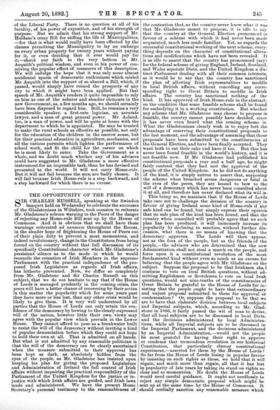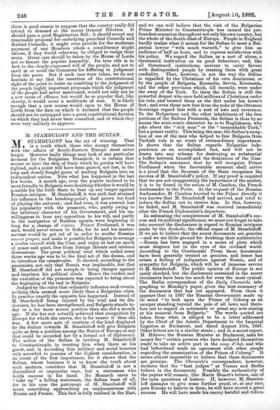THE OPPORTUNITY OF THE PEERS.
SIR CHARLES RUSSELL, speaking at the Swindon banquet held on Wednesday to celebrate the successes of the Gladstonians in Wiltshire, took occasion to reiterate Mr. Gladstone's solemn warning to the Peers of the danger of rejecting any Home-rule Bill sent up by the House of Commons. And it is obvious that we shall have these warnings reiterated ad nauseam throughout the Recess, in the slender hope of frightening the House of Peers out of their plain duty to prevent a most momentous, and indeed revolutionary, change in the Constitution from being forced on the country without that full discussion of its specifically Constitutional character which Mr. Gladstone's persistent silence as to the mode in which he would reconcile the retention of Irish Members in the supreme Parliament with the practical independence of the pro- posed Irish Legislature as regards all Irish affairs, has hitherto prevented. Now, we differ so completely from Mr. Gladstone and Sir Charles Russell on this subject, that we do not hesitate to say that if the House of Lords is managed prudently in the coming crisis, the peers will have a better chance of recovering by their action in this matter the popularity which for some years past they have more or less lost, than any other crisis would be likely to give them. It is very well understood by all parties that the House of Lords can only retain the con- fidence of the democracy by bowing to the clearly-expressed will of the nation, however little their own views may agree with the popular view which prevails in the Lower House. They cannot afford to pose as a breakwater built to resist the will of the democracy without inviting a kind of popular denunciation before which they could not hope to hold their own at all. That is admitted on all hands. But what is not admitted by any reasonable politician is that the will of the democracy can be clearly ascertained when the• measure submitted to their approval has been kept as dark, as absolutely hidden from the eyes of the people, as Mr. Gladstone has insisted upon keeping his plan for giving the proposed Legislature and Administration of Ireland the full control of Irish affairs without impairing the practical responsibility of the Parliament of the United Kingdom for the justice or in- justice with which Irish affairs are guided, and Irish laws made and administered. We have the present Home Secretary's personal testimony to the reasonableness of , the contention that, as the country never knew what it was that Mr. Gladstone meant to propose, it is idle to say that the country at the General Election pronounced in favour of a scheme with which it had never been made acquainted, much less made familiar. Yet, as regards the successful constitutional working of the next scheme, every- thing depends on the character of constitutional altera- tions and modifications which have not been revealed. It is as idle to assert that the country has pronounced (say) for the federal scheme of giving England, Ireland, Scotland, and Wales separate Diets, and the United Kingdom a dis- tinct Parliament dealing with all their common interests, as it would be to say that the country has sanctioned the plan of allowing Irish representatives to meddle in local British affairs, without conceding any corre- sponding right to Great Britain to meddle in Irish affairs. The country has sanctioned nothing of the kind. It has approved of Irish Home-rule in the abstract, on the condition that some feasible scheme shall be found for embodying it in a working constitution. But whether any scheme that Mr. Gladstone may choose to propose is feasible, the country cannot possibly have decided, -since it has never even heard what the coming scheme is. What the Gladstonians clearly wish is to enjoy both the advantage of reserving their constitutional proposals to the last moment, and the advantage of assuming that those proposals have been submitted to the constituencies at the General Election, and have been finally accepted. They want both to eat their cake and have it too. But this has never been found feasible in the world's history, and it is not feasible now. If Mr. Gladstone had published his constitutional proposals a year and a half ago, he might fairly contend that they had met the approval of the people of the United Kingdom. As he did not do anything of the kind, it is simply untrue to assert that, supposing- the scheme when broached seems dangerous or fatal in theeyes of the peers, they are bound to bow to the will of a democracy which has never been consulted about it at all, and therefore has never declared what its will is.
This being so, we maintain that if the House of Lords take care not to challenge the decision of the country in favour of giving Ireland some kind of Home-rule if any safe kind can be found, but simply express their opinion that no safe plan of the kind has been found, and that the country when consulted will probably agree that no such plan has been produced, it will immensely increase its popularity by declining to sanction, without further dis- cussion, what there is no means of knowing that the democracy approves. The Lords will then appear, not as the foes of the people, but as the friends of the people,—the advisers who are determined that the new Administration shall not steal a march on the people, and force upon it a constitutional revolution of the most fundamental kind without even so much as au excuse for believing that the people agree with Mr. Gladstone on the subject. Suppose the proposal to be that Irishmen sha I continue to vote on local British questions, without ad- mitting Englishmen or Scotchmen to vote on local Irish questions, would not nine-tenths of the constituencies of Great Britain be grateful to the House of Lords for in- sisting that the people ought to have that extraordinary and unjust proposal submitted to them for approval or condemnation ? Or, suppose the proposal to be that we are to have that elaborate division between local subjects and Imperial subjects, which, according to Mr. Glad- stone in 1886, it fairly passed the wit of man to devise, that all local subjects are to be discussed in local Diets, and the decisions administered by local Administra- tions, while all Imperial subjects are to be discussed in the Imperial Parliament, and the decisions administered by an Imperial Administration,—would not the people be most grateful for having their right to approve or condemn that tremendous revolution in our historical Constitution, that particularly clumsy constitutional experiment,—asserted for them by the House of Lords ? So far from the House of Lords losing in popular favour by insisting on such rights as these, we hold that it will regain, and much more than regain, all that it has lost in popularity of late years by taking its stand on rights so clear and so momentous. No doubt the House of Lords would need careful guidance. It ought not needlessly to reject any simple democratic proposal which might be sent up at the same time by the House of Commons. It should cordially sanction any reasonable measure which there is good reason to suppose that the country really did intend to demand at the recent General Election. It should pass a good Registration Bill; it should accept any reasonable proposal for embodying parochial Councils and district Councils; it might even provide for the moderate payment of any Members whom a constituency might choose, if they would otherwise be obliged to resign their seats. Great care should be taken by the House of Lords not to thwart the popular Assembly. Its true role is to bow to the clearly-expressed will of the people, and not to cavil at or scold the Commons for differing in judgment from the peers. But if such care were taken, we do not hesitate to say that the assertion of the constitutional right of the peers to insist on remitting to the judgment of the people highly important proposals which the judgment of the people had never sanctioned, would not only not be a new cause of offence, but would be so popular that, like charity, it would cover a multitude of sins. It is likely enough that a new course would open to the House of Lords from the date on which it declared that the people should not be entrapped into a great constitutional decision on which they had never been consulted, and of which they were very unlikely to approve.



































 Previous page
Previous page